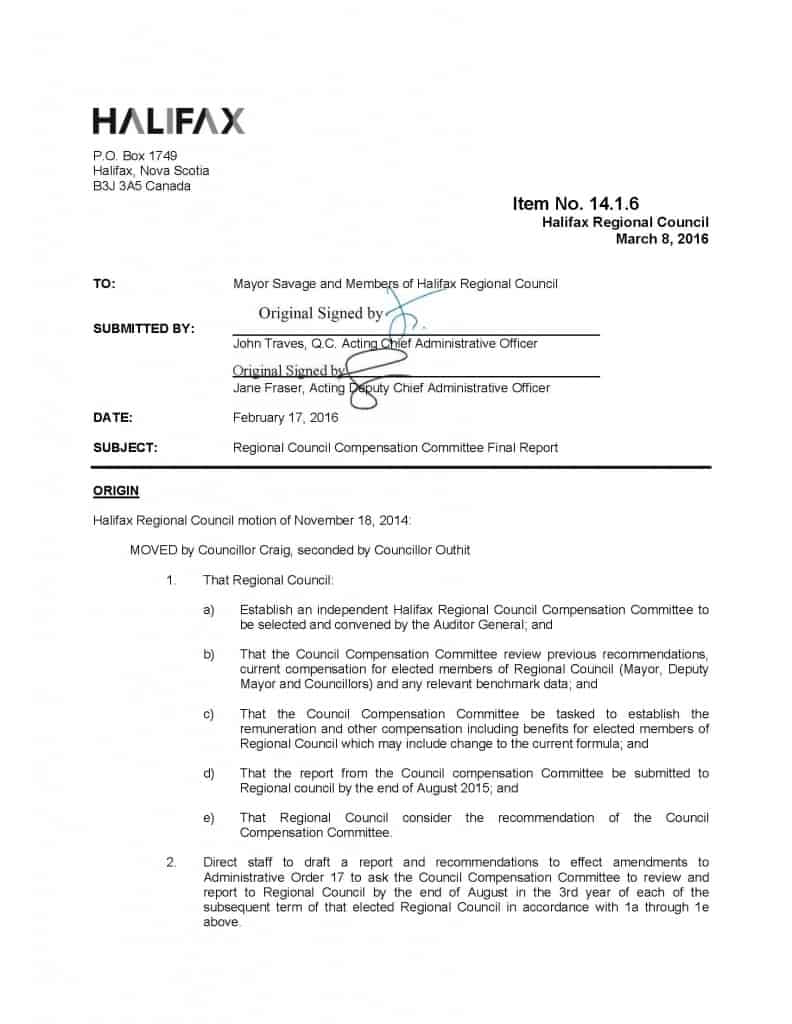
The short answer — as evidenced by last week’s emotional, confrontational, personal three-hour city council debate — is you can’t.
In November 2014, councillors asked the auditor general to convene an outside committee to devise a new salary formula.
Under the existing scheme — in place since a 2004 citizens’ commission report — councillors’ salaries are set at the average of what’s paid elected officials in other, supposedly comparable Canadian cities, including Halifax, plus 50 per cent of the difference between that and the highest salary levels.
The new committee called that formula — which has goosed salaries above inflation — “unfairly biased,” and “no longer appropriate.”
So it came up with its own “reckless” (Deputy Mayor Mat Whitman), “flawed” (Councillor Russell Walker), “arbitrary” (Mayor Mike Savage) scheme: councillors would get the average wage of a fulltime Halifax worker, plus 25 per cent.
Because what they would be paid under the new formula ($73,967) is more than they currently receive ($82,653), the committee recommended their salaries be frozen until the numbers aligned.
Unsurprisingly, councillors said no.
I confess I’ve occasionally mused about tying the salaries of our provincial MLAs — whose actions can have a direct impact on other people’s wages — to the average industrial wage to encourage them to work harder to increase it. But city councillors have less clear-cut influence on economic growth. Using average wages as a benchmark seems primarily designed to embody a corporate view of the value of public service.
Although the report claims its members used “knowledge, experience and best judgment” in coming up with their recommendations, one wonders whether they — well compensated private sector workers, whose salaries, I’m guessing, are set by comparing them to other accountants, lawyers, etc. — would willingly have their own compensation set that way.
City councillors, as even the report concedes, are public figures in positions of trust, “expected to be on call at all times of the day, including evenings and weekends,” have little job security and — thanks to the recent reduction in the number of councillors — now face even heavier workloads.
What’s fair?
I don’t know.
I agree the previous formula wasn’t. But I’m not convinced this one is either.
Time for a better drawing board.




 STEPHEN KIMBER, a Professor of Journalism at the University of King's College in Halifax and co-founder of its MFA in Creative Nonfiction Program, is an award-winning writer, editor and broadcaster. He is the author of two novels and eight non-fiction books. Buy his books
STEPHEN KIMBER, a Professor of Journalism at the University of King's College in Halifax and co-founder of its MFA in Creative Nonfiction Program, is an award-winning writer, editor and broadcaster. He is the author of two novels and eight non-fiction books. Buy his books
This nails it, Stephen. How, indeed, do you determine the value of elected officials? IMO we shouldn’t make it a financial penalty for people to choose to serve their community in this way, but at the same time the compensation needs to be tied to something based in reality.
That said, I think that Council should have accepted the recommendations of the report, or at least some version of it. Or at very least, they should have passed a motion to send the thing back to the drawing board along with their concerns rather than kill it entirely. The existing system makes no sense and it erodes trust among the public every single year that the news comes out that Mayor and Councillors received another raise when the average Haligonian has not.